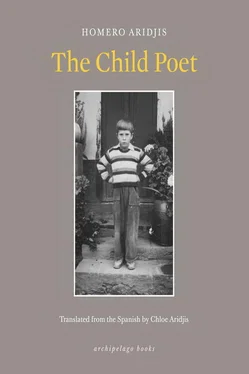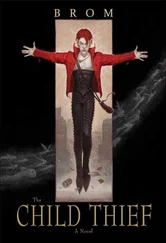Next he brought me Emilio Salgari’s Sandokan novels and Michel Zevaco’s Bridge of Sighs .
But as I read them so quickly they were running out of books at the small bookstore in Toluca.
Once I could take small steps they brought me out to the corridor, where they sat me down, accompanied by my mother, to take some sun alongside the other convalescing patients, nearly all women.
Saturday evening they took me to the hospital movie theater, where they were showing a film with Stan Laurel and Oliver Hardy.
The entrance to the theater was also the entrance to another spectacle, one of misfortunes portrayed almost allegorically by such pitiful cases that seeing them in succession depressed me. There were old men without legs, armless men, crippled children, women with bandaged chests, and patients who had recently had surgery on many parts of the body, a sampling of the great variety of ills that afflict mankind.
Most of the audience that filled the hall looked so unhealthy you wouldn’t have thought they were there for a screening but rather for a meeting of candidates for the beyond. Some wore awful smiles on their cadaverous faces; one man who was deathly pale, with a greenish cast and trembling hands, stared at me, looking as wretchedly unhappy as if he were being broken apart; and when the show started he kept on staring fixedly at me, seeming unaware the film had begun.
Otherwise, although the movie was funny no one laughed, or they couldn’t laugh because of their injuries, responding to the occasional comic moments with a groan or a sigh. In the silvery light the projection of the film lent the hall, you could see their mournful faces, as if the everyday world where the film was taking place made them deeply long for their own homes, or made them feel they would never return to them.
On their feet and leaning against the walls, the nurses looked from patients to screen and screen to patients. Sitting next to me, my parents didn’t laugh at what was happening on the screen but they didn’t seem unhappy either. The only people who enjoyed the film somewhat were the patients’ relatives, who, obliged to remain in seclusion, found some relief from the continual strain of life at the hospital.
The following day in the corridor when my parents asked a passing nurse why they’d opened the side door that was always shut and she replied that a corpse had been removed and this was the door they always used to remove corpses so the sick patients wouldn’t notice and get scared, I was horrified by the possibility that just a few days ago the door could have been opening for me. Other than that, when I saw my body and studied my face in the mirror, I trembled with joy to realize it was me.
On the way back to my room I passed the dining room and on the table saw some bananas spreading their scent. Some had softened so much they almost came apart in the nurse’s hand, others were barely speckled to a tasty yellow, fully ripe.
Handing me one, the nurse told me to save it for after dinner.
One Saturday we returned to Contepec. I had many books and my parents were glad to get back to our village and our home.
The nurses said they would miss us, as if during our stay at the hospital we’d established a friendly bond. Upon leaving I felt that something of ours would remain forever in the room, and I looked with melancholy at the door about to close on the other person I once was, as if I were abandoning inside the room the body that had carried me from the day of my birth till the day of my accident, to convalesce in this other body that carries me still, whose novelty I felt at the time.
And furthermore the room, which had been inhabited by us for a time, would inhabit our memory from now on, its walls, beds, and chairs commingling with our moods and the color of our days there.
In my eyes a very long time had passed, an interior time not measured by the time on clocks, because of the traces, the waiting, the infinities it leaves in your being.
My parents’ countenances had changed; an expression of alarm would appear on their faces at the slightest injury or the most unthreatening illness; they would be frightened if anyone screamed, assuming something serious had happened, or if a relative began to cry, they would imagine the weeping was over the death of a member of the family; they were convinced that routine mishaps were fated to have terrible consequences.
My eyes also saw my brother and my friends in a different light; and though I felt the same familiarity and affection, something incommunicable now separated me from them. The feeling of having returned from a journey that wasn’t measured by the kilometers between Contepec and Toluca, but rather by the internal distances traveled, made me want to tell them something important about those days, but when I realized that they knew the external facts of my accident, and that my intimate experience was as impossible to convey as an act of love, I kept quiet.
There are moments in your destiny when years are compressed into days, and days into hours, by the intensity with which events transform your life, events almost able to erase a past, and if not to erase it, then at least to shut it off from yourself, erecting a wall that separates the days of your childhood from the days of your adolescence, as if those days had been lived by two separate people, not by one person at two different ages. To build a bridge between the two, to pass from the adolescent to the traumatized child, to know that they are one and the same, to find that only one who was and who is; that has, to a large extent, been the purpose of this narrative.
The return to Contepec was a return to the present. Time was given back to me and, with it, the rhythm of life. I knew if I hadn’t died at the age of ten, every instant, every hour, every day, meant more life. Looking back, drowsing much later on a train, I saw San Juan de la Cruz rescued from a well, and Piero della Francesca blind in Borgo Santo Sepolcro, as unrepeatable and finite existences of my own being, in a timeless projection of myself.
Blood ran through my body, my eyes saw the light, my brain thought, the world’s mysterious movement ceaselessly created itself within me and without; and upon every shadow lay the spirit of God.
THE TREASURE buried beside the sapodilla tree glowed at night. But in order to actually find it, you had to catch the phantom that guarded it. And this phantom was visible only to Lola the maid, who’d recently arrived from Ojo de Agua.
The phantom was whitish (Lola would say “softish”), almost transparent (Lola would say “floury”), with black boots just like the ones my cousin wore, and of medium height.
At certain moments during the night, Lola said, she could see it sitting at the foot of her bed, watching her.
But she saw it most often beside the sapodilla tree, where it laid her face down and flickered over her until the break of dawn. As soon as the sun came out, the light erased it.
In our game of tag, *Ricardo el Negro ran the most.
Over the benches and across the fields he’d chase my brother, the only one left to be tagged. Watching them from my window run around the square, I wondered if there wasn’t some way to suspend the instant that was disappearing with its beings and their shadows; and whether the light that was starting to fade from the wall couldn’t be charmed by some magic word; and whether the poet, like some solitary enchanter, when he spoke of what took place in time, wasn’t saving it from oblivion.
The game ended at nightfall, with my brother tagged by Ricardo el Negro. The boys scattered toward their homes. No more rays of light on the window, and Ricardo el Negro, the winner, faded from my eyes, swallowed by the uniform blackness.
Читать дальше












